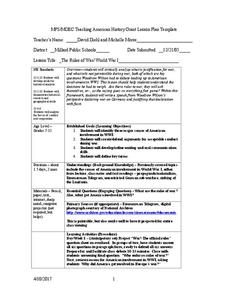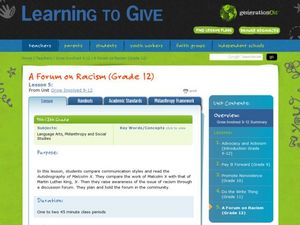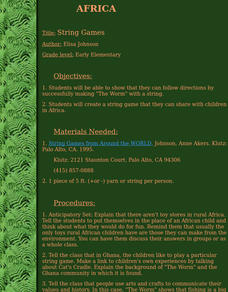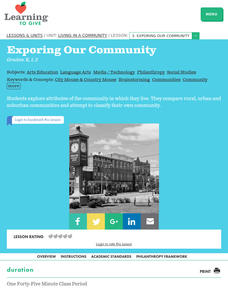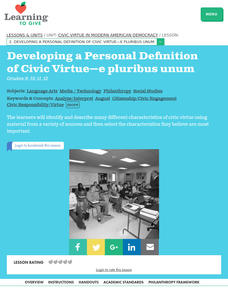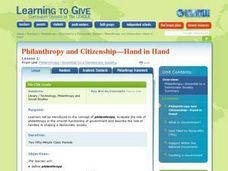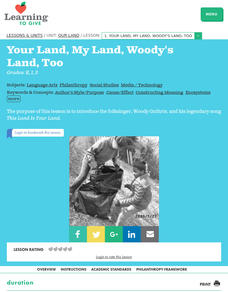Curated OER
The Rules of War/World War I
Students explore the reasons the United States became involved in World War I. In this World History lesson, students research the reasons Woodrow Wilson made the decisions he did, prepare a debate and write a paper.
Curated OER
Nutrition
Seventh graders investigate nutrition and nutrients. In this nutrition or diet lesson, groups of students create a poster, commercial, or skit about a nutriet which will be presented or performed to the rest of the class after...
Curated OER
Using R&R to Teach Mathematics
Second graders create a shape garden. In this polygons lesson, 2nd graders practice making shapes using a geoboard and read the book The Greedy Triangle by Marilyn Burns. Students also design a shape garden using construction paper.
Curated OER
Descriptive writing
Fourth graders practice writing with description. In this descriptive lesson, 4th graders see the results of a task when the directions are not clear. They come up with descriptive words and write their own instructions.
Curated OER
A Forum on Racism
Twelfth graders compare and contrast the work of Malcolm X and Martin Luther King, Jr. In this racism lesson, 12th graders read The Autobiography of Malcolm X and discuss how Malcolm X and Martin Luther King, Jr. approached ending racism.
Curated OER
Fair Trade
Students discuss philanthropy. In this fair trade lesson, students discover the meaning of fair trade. They are given the definition and work in small groups to read further on the topic and answer questions. This lesson includes...
Curated OER
Building Trust
Students identify the qualities that make them trustworthy. In this philanthropy lesson, students define the word "trust" and play a game that demonstrates trust between the players. Students discuss people they know who are trustworthy.
Curated OER
What is Justice?
Eighth graders discuss justice and fairness. In this equitable treatment of others lesson plan, 8th graders say the Pledge of Allegiance and read a passage from a blog. Students discuss the terms: fair, just, and equitable.
Curated OER
Stamp of Courage
Students discuss the attributes that a hero can have and what it takes to be a Distinguished American, and be commemorated on a stamp. In this courage instructional activity, students research an everyday hero that they know about and...
Curated OER
Dalai Lama: Day 2 of 5
Sixth graders explore philosophy by researching the Dalai Lama. In this Tibetan history lesson, 6th graders discuss the influence of Buddhism on the Dalai Lama and the unique view on life a Buddhist must have. Students read a Tibetan...
Curated OER
Games and Activities to Teach Molecular Genetics
Students demonstrate a working knowledge of cell interactions such as DNA replication, protein synthesis (transcription and translation), through active participation in a cooperative group.
Curated OER
Ways we are Alike/ Ways we are Different
Students complete a chart comparing and contrasting African villages with their own communities. The lesson focuses on the Mbuti and Fulani people. They explore their style of living, their traditions and everyday life in these villages.
Curated OER
String Games
Fourth graders show that they can follow directions by successfully making "The Worm" with a string. They reate a string game that they can share with students in Africa.
Curated OER
An Introductory Lesson on Maps
Students identify what a map is. They draw their own map using a simplified overhead view. After hearing the book, "Nikk's Adventure," students create their own maps.
Curated OER
Understanding a Legislator
Using a videoptaped segment of a Connecticut legilative session, students role-play designated legislators, researching positions, and making presentations. They compare their class votes with the actual outcome.
Curated OER
Exporing Our Community
Students explore attributes of the community in which they live. They compare rural, urban and suburban communities and attempt to classify their own community. Each group illustrates their assigned area by drawing buildings, trees,...
Curated OER
What Is A Community?
Learners engage in a lesson which introduces the definition of a community and challenges them to explore the characteristics of their own community. This lesson uses the true story of Humphrey the Lost Whale as an illustration of how...
Curated OER
Philanthropy, Volunteering And Service: the Historical Connections Lesson 2: Hunger Hurts
Students investigate the effects of hunger on a personal and community level. They examine how philanthropy can help alleviate hunger issues in the world and in their own community. They look at the available services using Internet...
Curated OER
Civic Virtue in Democracy
Students identify and describe characteristics of civic virtue. Following a class discussion, they create their own definitions of civic virtue. They write essays based on their own definitions and formulate conclusions on the state of...
Curated OER
Philanthropy and Citizenship-Hand in Hand
Students define philanthropy and evaluate how the government would functin without the help of volunteers. They write song lyrics, participate in a class discussion, and complete a Venn diagram.
Curated OER
Philanthropic Literature Lesson 1: The Lonely Fish
Students investigate the concepts of sharing and good citizenship, and how they contribute to a peaceful society. They work on problem solving and critical thinking skills after listening to Marcus Pfister's, The Rainbow Fish.
Curated OER
Our Family
Students explore the roles of family members. They read books, discuss the special talents of household members, and create a class family album book using photographs brought in by the students.
Curated OER
Your Land, My Land, Woody's Land, Too
Young scholars are introduced to the folksinger, Woody Guthrie, and his legendary song This Land Is Your Land. After listening to the song, students engage in a discussion which emphasizes that Woody Guthrie wrote songs for everyone;...
Curated OER
Our Constitutional Connection Lesson 3: To Vote Or Not To Vote? That is the Question!
Students design colorful posters to "get out and vote" after studying the three amendments to the US Constitution that extend voting rights. They analyze the importance of voting to a healthy democracy.
Other popular searches
- Anticipatory Sets in Science
- Math Anticipatory Sets
- Physics Anticipatory Sets
- Anticipatory Sets in History


